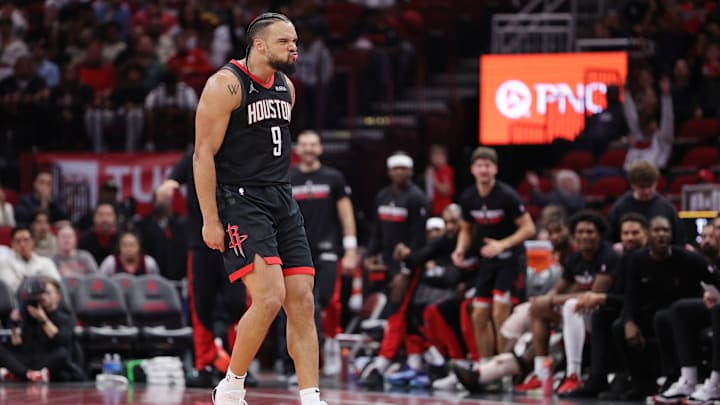The Houston Rockets spent three years tanking. They've had to put in some elbow grease to move on from that era of (horrendous) basketball.
The team had to overcome its reputation as a bottom feeder. Luckily, the work is done. The Rockets look like one of the best teams in the league at 14-6. Even if they regress, it's indisputable that this team is competitive.
So much for the theory that tanking destroys a team's competitive spirit.
Part of the process of moving forward was a huge 2023 offseason. The Rockets signed Fred VanVleet and Dillon Brooks. A lot of fans felt that they overpaid for each. That may have been a necessary measure - the Rockets paid a tanking tax to bring in two quality veterans.
Brooks' contract inspired a special kind of ire. He'd been unceremoniously ushered out of Memphis. Why would the Rockets pay $20 million a season for a player like Brooks?
Are we seeing why yet?
Rockets shouldn't regret Brooks deal
By now, Brooks has endeared himself to Rockets fans. One thing is undeniable - Brooks plays with maximum effort.
Is it paying off?
The numbers tell a mixed story. Brooks' Box Plus/Minus (BPM) of -2.2 is subpar. That number matches his Offensive Box Plus/Minus (OBPM), and his Defensive Box Plus/Minus (DBPM) of 0.0 is surprisingly mediocre.
Moreover, fans are enamored with Brooks' 37.6% shooting on 5.5 three-pointers per game. That's great, but his True Shooting % (TS%) of 52.5% is still underwhelming. So, it's time to trash the contract, right?
Not so fast. Per CleaningTheGlass, the Rockets' best lineups feature Brooks. When he's on the floor with Amen Thompson, Fred VanVleet, Jabari Smith Jr., and Alperen Sengun, the Rockets are +36.4 over 107 possessions. That puts them in the league's 100th percentile.
That's not a typo. The league's 100th percentile.
I know what you're thinking - that's just the starters, only with Thompson plugged in for Jalen Green right? Isn't that lineup's success more attributable to Thompson?
Here's the rub - the starters are performing well too. They're +11.6 (73rd percentile) in 551 possessions. So, Brooks is a common denominator in Houston's two best lineups.
He's being carried? Try again. Per CleaningTheGlass, Brooks is +18.0 - the highest mark on the team. His value really shows on defense, where Brooks' lineups are holding opponents to -14.8 points per possession (99th percentile) and -4.4 Effective Field Goal % (eFG%), which is in the 91st percentile.
What gives?
Brooks is worth his Rockets contract
Nobody should take statistics at a surface level. It's always worth digging under the hood.
Brooks routinely guards the opposing team's best player. At times, he'll even guard centers. That allows Sengun to roam off of the opposing team's worst player, where he's most effective. So, that DBPM is misleading.
The offensive efficiency is a bit more accurate. Although, it's worth noting that Brooks isn't strictly a catch-and-shoot specialist. The Rockets look to him to create from-scratch offense. That's likely to put a burden on any player's efficiency.
Still, that only serves as an argument against Brooks' current usage. He's not qualified as a shot creator if he can't reliably create shots. Fine:
He's worth his contract anyway.
True 3-and-D wings are much rarer than they're given credit for. The league is littered with great defensive wings who can't hit threes and knockdown shooters who can only defend in theory. Guys who can hit open triples and defend are a scarce commodity.
In 2024-25, Brooks fits the bill.
That's not to say the contract deserves a perfect grade. Taking Brooks' 37.6% shooting at face value would be foolish when he's a career 34.7% three-point shooter. Still, Brooks deserves a lot of credit. He's hitting open threes, defending with relentless aggression, and even bailing the Rockets out of bad possessions from time to time.
Good thing the team isn't tanking anymore: Brooks would make it exceedingly difficult.
Grade: B+
